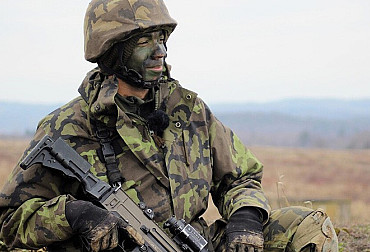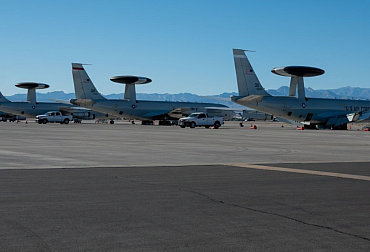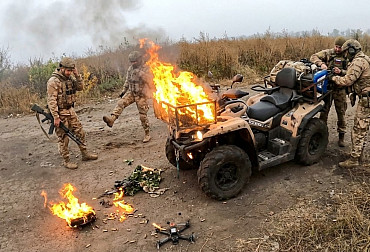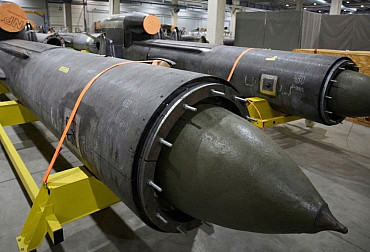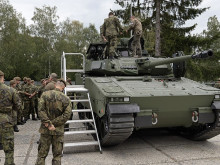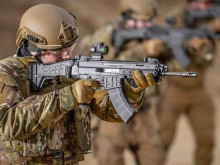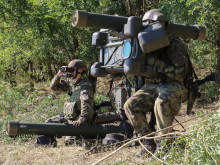The Defence Committee discussed the purchase of tracked IFVs for the Czech Armed Forces and the situation in Ukraine
The situation in Ukraine and information from the Ministry of Defence on the order for tracked Infantry Fighting Vehicles were the main topics discussed by the Defence Committee at its 6th meeting yesterday afternoon. The Committee, as in the previous term, also established three subcommittees: the Subcommittee on Ministry of Defence Acquisitions, Trade in Military Material and Innovations of the Czech Armed Forces, whose chairman is Karel Krejza (ODS), the Subcommittee on Defence, Cyber and Security Policy and Strategic Concepts of the Czech Republic, which will be chaired by Josef Bělica (ANO), and the Subcommittee on War Veterans, which will be chaired by Pavel Růžička (ANO).
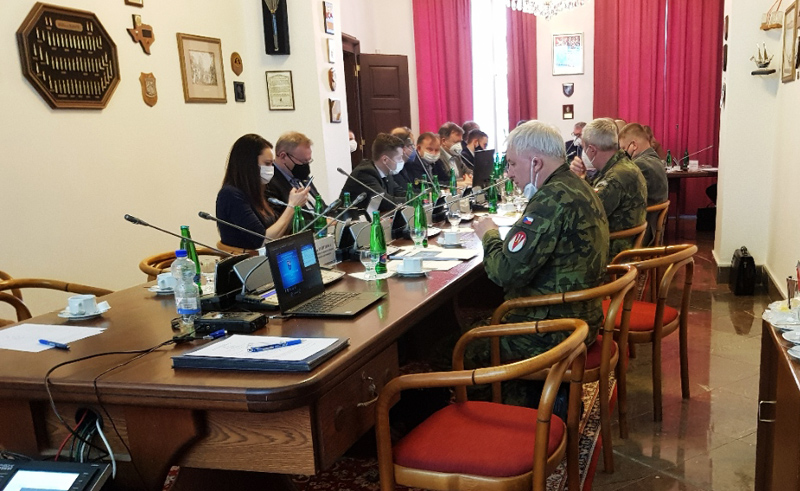 Picture: The situation in Ukraine and information from the Ministry of Defence on the order for tracked infantry fighting vehicles were the main topics discussed by the Defence Committee at its 6th session yesterday afternoon | Jan Zilvar / CZ Defence
Picture: The situation in Ukraine and information from the Ministry of Defence on the order for tracked infantry fighting vehicles were the main topics discussed by the Defence Committee at its 6th session yesterday afternoon | Jan Zilvar / CZ Defence
The Committee has been dealing with the situation in Ukraine in a closed session since its last meeting with the participation of Defence Minister Jana Černochová. This time, the Committee did not end the discussion and suspended it until the next session. The meeting also again heard information from the Military Intelligence Directorate, which was presented by its director, Maj. Gen. Jan Beroun. The meeting was also attended by the Chief of the General Staff of the Czech Armed Forces Arm. gen. Aleš Opata. Specifically, the establishment of so-called NATO battlegroups, forward battle groups, within the framework of Enhanced Vigilance Activities (eVA), which will be established in four countries - Slovakia, Hungary, Romania and Bulgaria - was discussed. This is part of the enhanced NATO presence on the territories of these countries. The Slovak group will include some 400 soldiers of the 4th Rapid Deployment Brigade. The request for the deployment of the entire contingent of 650 soldiers will then be submitted by Defence Minister Černochová to the Government meeting today so that both chambers of the Parliament of the Czech Republic can approve the deployment in accordance with the Constitution of the Czech Republic. In the meantime, the Army will carry out humanitarian activities, such as providing tents and facilities for Ukrainian refugees and other activities, which will be expanded by the ongoing NATO exercise Saber Strike 2022.
The Defence Committee subsequently discussed the procurement of tracked Infantry Fighting Vehicles, which is still being addressed by the Ministry of Defence. This agenda item was also adjourned after extensive discussion, pending a legal analysis. The Committee will then return to the 'never-ending' tender at its next session. Minister Jana Černochová stated right at the beginning of the above-mentioned item that this tender is not only crucial for the Ministry and the Army, but it is also a NATO commitment. According to the Minister, the acquisition of these IFVs is a fundamental element of the Czech Republic's defence capability. That is why she is not convinced of the correctness of the set process, which has been running since 2012 and is still not completed due to bureaucratic complexity. According to the Minister, it would have been better to reconsider the current form of the tender and choose the G-G (Government-to-Government) method, following the example of the tenders already implemented (Helicopters, NATO Gun and MADR) instead of the complicated bureaucratic process. During the meeting, Colonel Ctirad Gazda, head of the project team for the acquisition of IFVs at the Armament and Acquisition Section of the Ministry of Defence, described the entire ten-year development of the effort to acquire tracked IFVs, from the so-called "emergence of the operational need" in 2012 to the present. This acquisition is also already facing a complaint to the European Commission for so-called unlawful public aid, which is allegedly related to the tenderer's requirement to conclude a contract with the state enterprise VOP CZ. The Ministry's next steps will be a legal analysis to be prepared by HAVEL & PARTNERS s.r.o. (the contract for the legal assessment of the tender was signed on 25 February). The result of the analysis will then be the definition of the next course of action, which will not stop the process of purchasing tracked IFVs and at the same time protect the Czech Republic from the threat of lawsuits and arbitrations.
From 10 March, the Chamber of Deputies will also discuss the state budget for 2022 in its final reading. Although its draft was initially reduced in the chapter of the Ministry of Defence, the situation is gradually changing in response to current developments.
In this context, we asked the members of the Defence Committee whether they thought that the 2022 budget, or its medium-term outlook, should be adjusted to take account of the need for significant investment in the modernisation of the Czech Armed Forces. Below are the responses from the Committee members who responded to us:
Lubomír Metnar (ANO), Chairman of the Committee
If the Government is serious about spending 2% of GDP on defence in 2025, then the medium-term outlook for 2023-2024 must definitely be adjusted to take into account the use of funds and to avoid an unaffordable, leapfrog increase in funding.
This year, there has been a cut of 5.4 billion, of which 4.83 billion is due to the non-implementation of the IFV project, the unnecessary and the impossibility of reprogramming these funds to other projects. In addition, EUR 0.52 billion was also cut due to the non-implementation of salary adjustments. Originally, we, the ANO Government, approved a CZK 1 400 salary increase, which I insist on, not only because of the current inflation. I do not agree with the lower rate of increase in view of the NATO commitment. Above all, defence spending must be continuous and growth must be gradual.
That is why I have also tabled two amendments on second reading to return these funds, as I am convinced that the Department needs these funds and that the soldiers deserve the salary indexation we have proposed and approved.
Pavel Růžička (ANO), Vice-Chairman of the Committee
Given the situation in Ukraine and the way the war is being waged, the Army will learn lessons and evaluate the medium-term plan. There must certainly be a reassessment of the purchase of IFVs, given the number of vehicles that will be on tracks and what can be put on a wheeled platform. Otherwise, this purchase cannot be financed, the soldiers must get off the pear tree and start thinking economically. At the original price, this purchase will no longer be feasible, and anyone who says it is is a fool. The real value is estimated to be somewhere in the region of 80 billion.
Stanislav Blaha (ODS), Member of the Committee
The original state budget for 2022 was absolutely unusable and we are only mitigating the damage done by the previous Government's populism. However, it should also be said that the state budget was approved by the Government at a time when war was not raging in Ukraine. This has, of course, changed the situation, and the Government is therefore working not only on how to effectively help Ukraine in its fight against an aggressive Putin, but also on how to mitigate the effects of runaway inflation and the consequences of Babiš's expensive policies. That is why the Minister, with the support of the Government, has tabled an amendment to increase the MoD budget by CZK 1 billion. This increase is to be directed towards the ministry's capital expenditure, specifically the acquisition of small arms to ensure the required capabilities of our Army. I support the budget in this way.
It must be said that the budget of the Ministry of Defence chapter must be increased only by money that the Ministry is then able to spend. There is no point in raising the budget populistically if the funds are then going to be returned. If it is clear that increasing the budget at the moment would not ultimately help anything, the money should be used elsewhere. Moreover, the Government itself has decided that the MoD will not lose money for modernisation projects in the future; on the contrary, the budget will grow depending on the projects in the pipeline.
Jiří Horák (KDU-ČSL), member of the committee
The budget to be voted on Thursday will not undergo any major changes. However, I assume that the Government will soon come up with an amendment to the state budget that will reflect the current problems. As regards possible changes to the budget with regard to the Army, this is clearly appropriate. The modernisation of military technology is more urgent now than ever, and I am convinced that the Government is aware of this. I would like to emphasise that the number one priority is to complete the tender for Infantry Fighting Vehicles, which the Army really needs, and there is general agreement on this. I therefore assume that there will be an increase in the budget of the Ministry of Defence during the course of the year. In the medium term, it is essential that the budget of the Ministry of Defence reaches at least 2% of GDP by 2025 at the latest.
However, the increase in this year's budget will not only concern defence. The state budget must also respond to other aspects of the war in Ukraine, namely migration, which means an increase in resources in the social and internal sectors. Furthermore, the Government must respond to the rise in energy prices and seek appropriate solutions to help the ordinary citizen of our country, because for a large part of our population, this is already having a significant impact on family budgets. All these measures will, of course, involve considerable costs, but the state must respond to the current situation in Europe.
Karel Krejza (ODS), member of the Committee
We have already approved a billion increase in the second reading, but it is not enough in view of the current situation. In the past, I have said that the MoD budget could handle an increase of 20 billion and there would be plenty to spend. However, if necessary, the Government will find the funds for armaments on an ad hoc basis. In any case, I am counting on a leap in the budget in 2023 and I will insist on it in the party and in committee! It is important, however, to adjust the acquisition process in parallel so that major purchases of modern equipment do not drag on for years and end up in cancelled tenders, disputes with the Office of the Minister of Defence and unused funds.
Petr Liška (STAN), member of the committee
It is appropriate to adjust the budget on the basis of decisions to acquire investments that are not included in the current budget. The proposed and discussed budget and the medium-term outlook contain investments that are known and decided upon. The current situation may necessitate purchases and investments not yet planned, but it is premature to adjust the budget now for uncertain expenditure.
The House can act flexibly when necessary, and I have no doubt that ensuring the defence of our interests and sovereignty is a compelling reason for doing so.
Radovan Vích (SPD), Member of the Committee
I am convinced that the current situation in Ukraine confirms our views on defence from 2016, i.e. that we need to comprehensively review our security and defence documents, including the Concept for the Construction of the Czech Armed Forces. In the long term, we need to fundamentally strengthen our defence capabilities and give the Army as much as it can take with strategic and significant acquisition projects prepared and agreed in advance.
As far as the 2022 budget is concerned, so far we are talking about an increase of CZK 1 billion, but more should be given to modernise the existing main types of armaments, equipment and material, as well as to replenish mobilisation stocks. For a start, it is enough to terminate the contract for the supply of US utility and combat helicopters used by the US Navy and to direct this instalment of CZK 4.3 billion here.
Lubomír Wenzl (ANO), Member of the Committee
The modernisation of the Czech Army was successfully launched by the previous Government of Andrej Babiš. New helicopters, renewal of the anti-aircraft missile system, 3D radars, a contract with the Czech Armaments Factory for the supply of firearms. In view of the war in Ukraine, these contracts have proved to be very prudent, but at the same time insufficient. 12 new American helicopters are not enough, we need more. Mainly so that we can get rid of the Russian helicopters that the Czech Army now operates and is therefore dependent on supplies of spare parts from Russia. For the same reason, the Government should generally reconsider the operation of military equipment originating from Russia.
The contract for the purchase of Infantry Fighting Vehicles, which has been postponed due to a decision of the current Government, should also be finalised as soon as possible. It is essential that the modernisation of the Czech Army should undergo an accelerated revolution instead of the slow evolution that has been taking place so far. And this will require billions of extra crowns, which the state budget does not currently provide for. At the same time, it is necessary to draw up a clear plan to protect the Czech Republic against modern threats, to set up stable financing for the Army and to simplify the rules for purchasing military equipment. It is an ideal time to involve the Czech defence industry more and to make full use of its potential.











